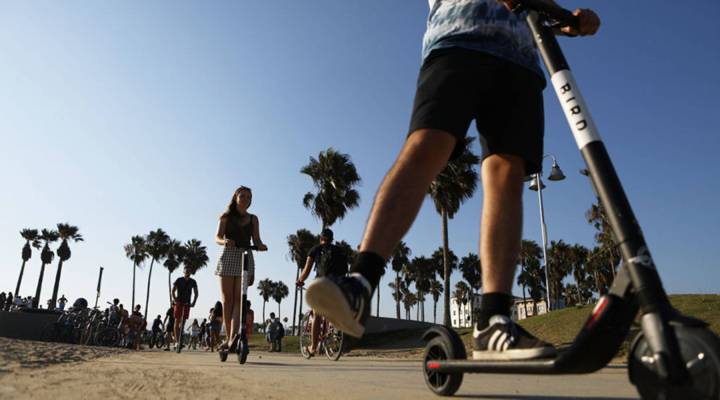
Electric scooter riders zoom along on shifting regulations
Electric scooter riders zoom along on shifting regulations

The electric scooter company Bird turned one this week and the company got a nice present from the state of California. Gov. Jerry Brown signed a law saying adults don’t have to wear helmets when they ride. It’s a big win for all e-scooter companies, but not so great for others.
“For some people, they’re blight,” said Scott Cummings, a law professor at UCLA. “They’re strewn around, they’re everywhere. They’re in walkways.”
Cummings said it’s easy to see why some cities have banned them while others have been more welcoming.
“The business model of these companies is to put their product out in the market, whether it’s legal or not, to try to generate demand and then to force local governments to adapt law in their favor,” Cummings said.
That approach is working in Santa Monica, at least, where a scooter pilot program was launched after companies unleashed their fleets there. But a mobility expert said the patchwork of differing rules has caused uncertainty for the businesses’ riders.
“You can’t have a situation where a person picks up a scooter, maybe on Venice Beach, and maybe they’re not required to wear a helmet, and they ride into Santa Monica, completely unknowingly, they may not know where the border is, and all of a sudden a helmet’s required, and they might be liable to a ticket,” said Marlon Boarnet, chair of the Department of Urban Planning and Spatial Analysis at the University of Southern California.
Boarnet said pushing for a state law to allow riding without a helmet was important for companies like Bird, Lime and Scoot. Even so, in a statement, Lime officials committed to pushing helmet usage onto their customers.
“We support safe riding practices, and will continue to encourage riders to wear helmets through messaging in our app and on our scooters, helmet giveaways and proactive education,” said Mary Caroline Pruitt, Lime communications manager. “All first-time Lime riders are required to complete an in-app tutorial that provides guidelines on helmet safety, and we will continue to implement tools like this to further promote safe riding and scooter use. The safety of our riders will always come first.”
The scooter companies face many other issues, like permitting requirements and speed limits. Boarnet said he expects more attention to scooter regulation at the state level.
“If we want to welcome this technology — and I think there’s reasons why we want to — we need some consistency,” Boarnet said. “And this may indeed be an area where state regulation is important.”
Meanwhile, the push for e-scooters keeps growing. They’re already rolling on the streets of Atlanta, Boston and Chicago. And Friday, legislation was introduced in the New York City Council to legalize the scooters there.
Safety concerns continue to mount as well. Friday, a scooter rider in Washington, D.C., was killed in a collision with an SUV.
There’s a lot happening in the world. Through it all, Marketplace is here for you.
You rely on Marketplace to break down the world’s events and tell you how it affects you in a fact-based, approachable way. We rely on your financial support to keep making that possible.
Your donation today powers the independent journalism that you rely on. For just $5/month, you can help sustain Marketplace so we can keep reporting on the things that matter to you.












